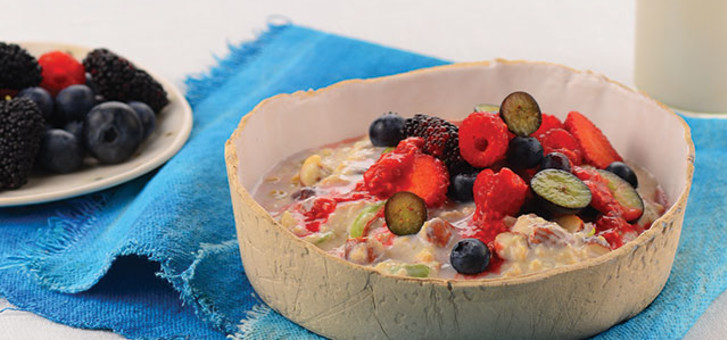Originally invented by the Swiss doctor and nutritionist Maximilian Bircher-Benner during the health reform era of the 1880s, it has taken the world by storm and you can find it on the breakfast menus of even the best restaurants and cafes.
Why it’s good for you
Depending on the combination and use of whole plant food ingredients, Bircher muesli can be high in protein, dietary fibre, iron and zinc and is perfect if you want:
- longer lasting energy
- better regulated blood sugar and cholesterol levels
- more raw food meals to reduce your exposure to the chemical, acrylamide, found in most processed breakfast cereals and other foods
But Bircher muesli is too good to save just for breakfast. The Swiss also serve it for dessert and in cups as a snack food!
Tweaking tips
While the classic recipe includes oats, lemon juice, nuts, whole green apples with the skin and some cream with honey or sweetened condensed milk, you can further improve or tweak it to suit your needs.
Soak Bircher muesli in a large bowl, small pots or mason jars in the fridge overnight. For an instant version, pour a little boiling water over the oats and nuts and soak for five minutes before stirring in the other ingredients.
Substitutions:
Rolled Oats Any other rolled grains such as rolled barley, spelt or rye. But note that they won’t be as sticky. Use quinoa flakes for a gluten-free version, and add extra seeds.
Cream or Condensed Milk: Soy or other non-dairy milk, sheep’s milk yoghurt or fruit juice.
Nuts: Any nuts of your choice (think chopped or ground up hazelnuts, almonds or walnuts) or, if you have an allergy, use seeds such as chia, ground flaxseed, pepita or sunflower. Mix seeds well before soaking, especially if using chia, so they don’t clump together.
Fruit: Grating in a green apple before serving is a must! But you can also add dried, fresh or poached fruit, such as chopped medjool dates, berries, or poached pears or quinces.




